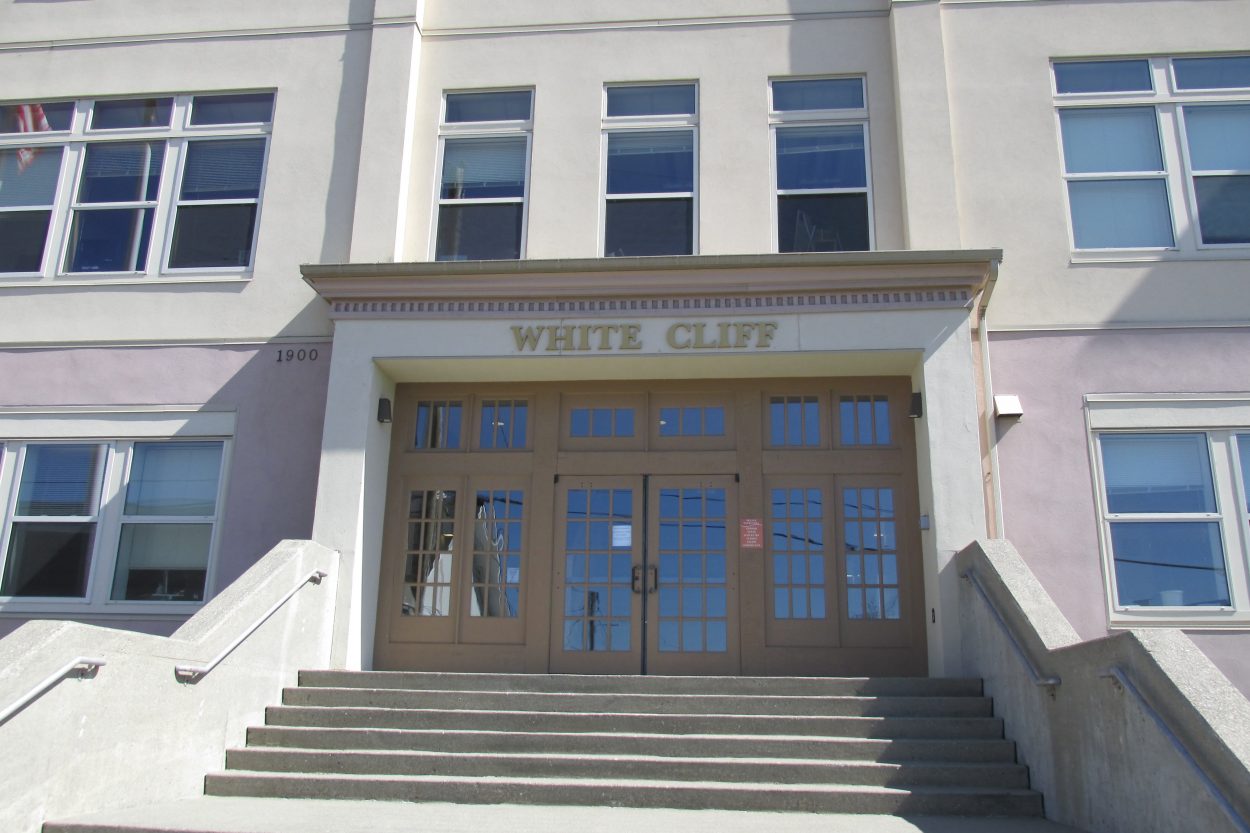
Ketchikan’s school board typically meets in the White Cliff building, shown here. (Maria Dudzak/KRBD)
Ketchikan students will no longer be tested for COVID-19 if they don’t show symptoms except in limited circumstances.
But Ketchikan’s school board on Wednesday stopped short of allowing COVID-19-positive students without symptoms to attend classes. The school board also left open the possibility that mask mandates may return in the future.
The 4-3 school board vote to end the test-to-stay program came after Superintendent Melissa Johnson said the school district’s recent move to a mask-optional policy made contact tracing impractical.
“I just think that because we took them basically or only mitigation away, which is masking, it doesn’t really make — and I’m not trying to be rude … I’m just saying that it would put way too much stress on our staff,” she said at Wednesday’s meeting.
The test-to-stay program, which was based on guidelines laid out by the Centers for Disease Control and Prevention, allowed unvaccinated students identified as close contacts to bypass quarantines by testing repeatedly. Johnson said health aides were testing hundreds of students daily even before masks were made optional.
Parents complained at Wednesday’s meeting that the program in practice kept students out of classes unnecessarily.
School board members Paul Robbins Jr., Bridget Mattson, Diane Gubatayao and Nicole Anderson voted to end the testing of students without COVID-19 symptoms.
Robbins, who put forth the proposal, argued that it was time to learn to live with COVID-19 as a part of everyday life.
“It needs to be treated like the remaining sicknesses that we treat them: if you’re sick, you go home if you’re, if you’re not sick, you don’t,” he said.
Other testing programs, including on-demand testing for people with symptoms and regular testing of athletes, are unaffected by the school board’s decision.
With the school district’s most broad-based testing program repealed, the school district said Thursday that students and staff would be “expected to self-report” if they test positive for COVID-19. Instead of contact tracing, the district says it will offer emails to notify classmates and teachers of exposure.
Ketchikan’s school board also rejected a proposal that would have allowed masks to be optional regardless of COVID-19 levels.
Instead, the board voted unanimously to decouple the schools’ COVID-19 risk measures from district-wide case levels. The school board set the school district’s risk level at “moderate,” the second-lowest level on the district’s four-tier COVID-19 mitigation plan.
That means masks will stay optional in classrooms and common areas for now. Masks automatically became optional on Feb. 21 after cases across the district fell below a key threshold. School board member Bridget Mattson says administrators should be able to bring back masks if there’s a spike of cases in a particular school.
“I think that we should leave that on the table, should we go back to a situation where we have incredible spread within a school that we are trying to keep open, that we’re trying to keep in person. And I think that to to have that there as our contingency emergency plan would be viable,” she said.
Masks will remain mandatory for fans at athletic events. School Board President Stephen Bradford expressed concerns that removing the mask mandate for spectators might jeopardize other Southeast Alaska schools’ willingness to send teams to a regional basketball tournament next month in Ketchikan.
“We’ve got eight communities coming who, as it now stands, are expecting that the spectators in the crowd will all be masked,” he said. “And I think it’s a problem if we suddenly change that, and that would have a horrible economic impact on this community if those communities pulled out.”
Public health authorities have offered qualified support for the relaxation in rules.
“Public Health supports the Ketchikan School Board’s decision to end the test-to-stay program if they feel it is in the best interest of the district,” head Ketchikan Public Health Center nurse Jen Bergen said in a statement. “We do urge a slow approach to ending mitigation, and it sounds like the school board is trying to do that.”
“My only concern with ending this program is it took quite a bit of time to get up and running and would not be easily reinstated if needed in the future. However, Ketchikan still has quite a bit of testing availability in the community, including at-home test kits,” Bergen added.
In other business, the board unanimously approved a two-year contract with new superintendent Michael Robbins. He’s set to begin work July 1 after obtaining a superintendent’s endorsement on his state teaching license. His salary was set at $145,000 plus benefits.





